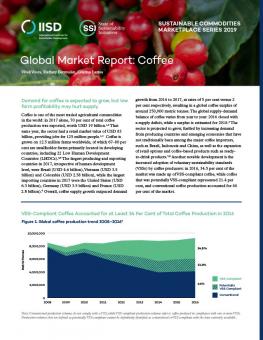
Global Market Report: Coffee
Voluntary sustainability standard-compliant coffee production is increasing at a higher rate than the overall sector, with significant growth coming from least-developed countries.
-
#DYK: Coffee is grown on 12.5 million farms worldwide, of which 67–80 per cent are smallholder farms primarily located in developing countries.
-
At least 34 per cent of all the coffee produced in 2016 complied with a voluntary sustainability standard.
-
In 2017, the coffee sector had a retail market value of US $83 billion, providing jobs for 125 million people.
Voluntary sustainability standard (VSS) compliant coffee production is increasing at a higher rate than the overall sector, with significant growth coming from least-developed countries.
The coffee sector’s projected growth is fuelled by increasing demand from producing countries and emerging economies traditionally not among major coffee importers, including Brazil, Indonesia and China, and the expansion of retail options, such as ready-to-drink coffee and pods or capsules. However, the growth of VSS-compliant coffee is concentrated mainly in traditional markets such as Europe and the United States and remains lower than supply. This supply–demand imbalance can limit the market growth potential of VSS-compliant coffee and needs to be addressed by value chain actors to benefit from the opportunities that stem from growing coffee demand from producing and emerging countries.
The Sustainable Commodities Marketplace Series from IISD presents sustainable production and consumption market information on agricultural commodities to foster transparency, knowledge and strategic decision making for sustainable development. Future reports will focus on banana, cocoa, cotton, palm oil, soybean, sugar and tea.
Additional downloads
You might also be interested in
Agreement on Climate Change, Trade and Sustainability: A landmark pact for trade and sustainability
The ACCTS pact, signed by Costa Rica, Iceland, New Zealand, and Switzerland, aligns trade and environmental policies, tackling fossil fuel subsidies, eco-labels, and green trade.
The Responsible Agricultural Investment Tool for Agribusiness and Case Studies
This report summarizes a collaboration to support agribusinesses in complying with principles of responsible investment in agriculture and food systems.
Promoting the Development of Agricultural Cooperatives
Governments in the Global South should promote agricultural cooperatives to boost smallholder access to fair markets, finance, and climate resilience.
Navigating Global Sustainability Standards in the Mining Sector
This brief examines the latest developments and trends in responsible mining standards and voluntary sustainability initiatives.